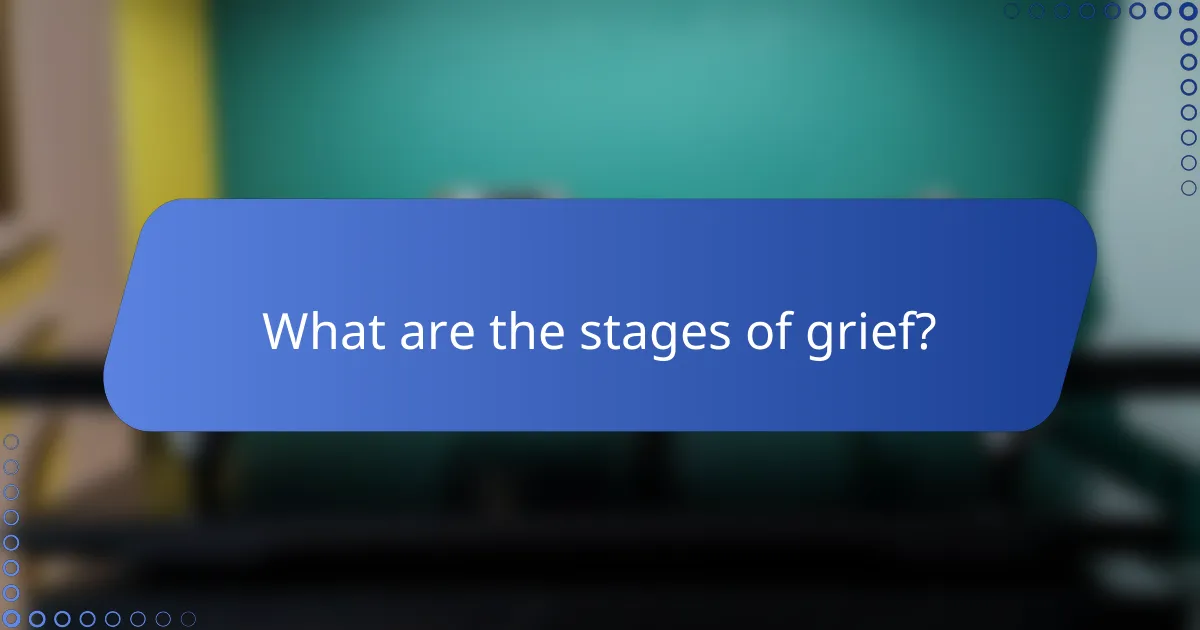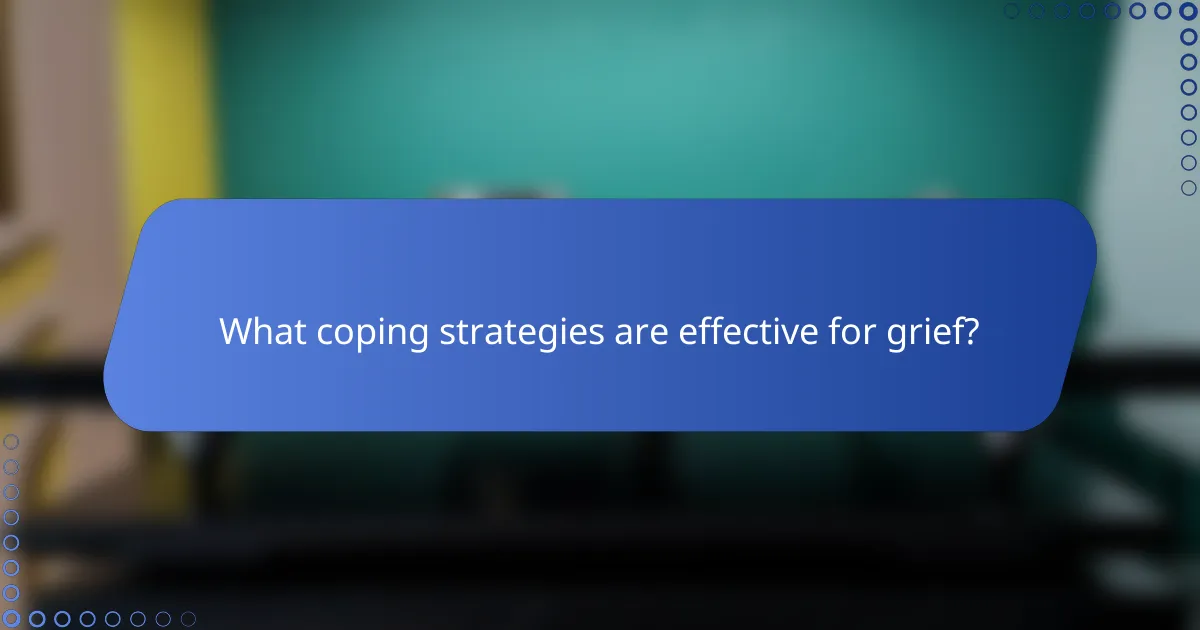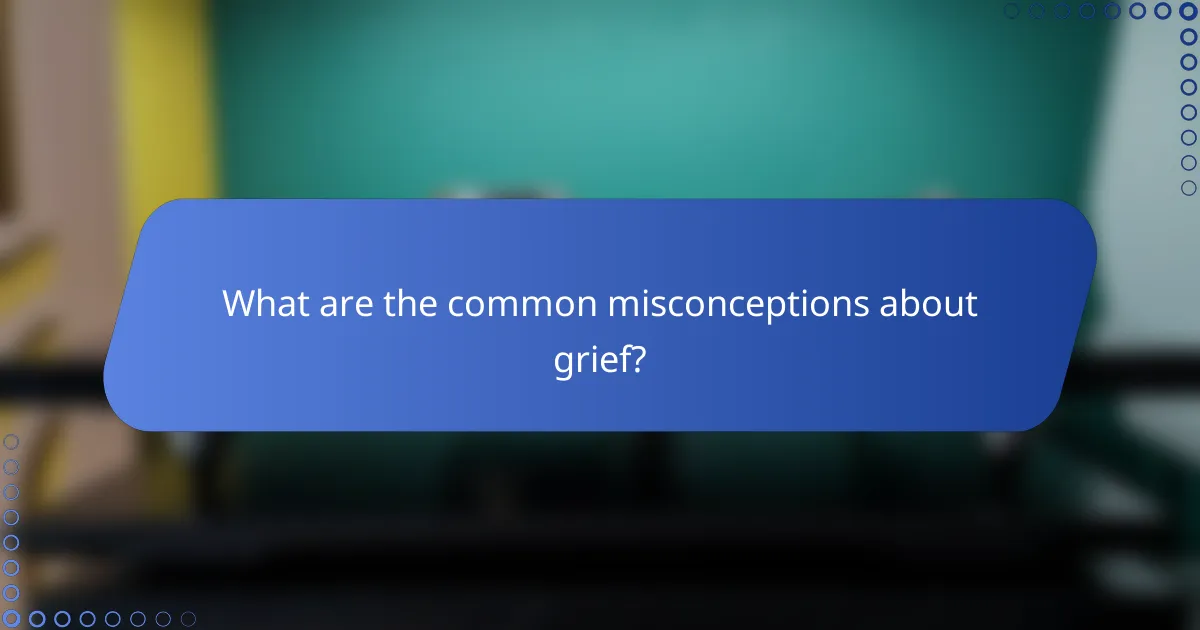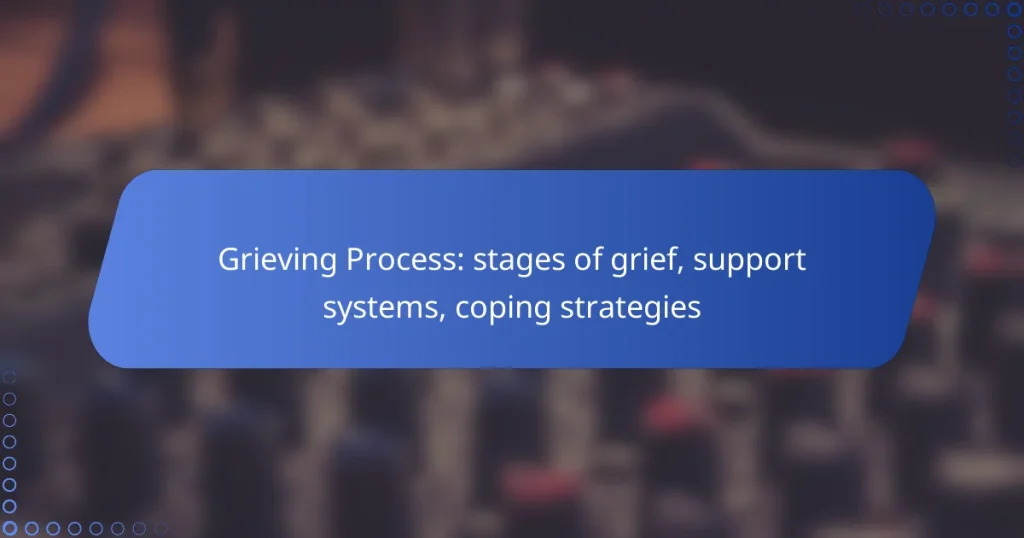The grieving process is a complex journey that encompasses various emotional responses following a loss, often characterized by stages that differ in duration and intensity for each individual. Support systems, including local groups and online resources, play a crucial role in providing the necessary emotional assistance during this challenging time. Additionally, effective coping strategies can help individuals navigate their grief, offering methods to process emotions and find comfort in their healing journey.

What are the stages of grief?
The stages of grief are a series of emotional responses that individuals typically experience after a loss. These stages, often described in a linear fashion, can vary in duration and intensity for each person.
Denial
Denial is often the first reaction to loss, serving as a defense mechanism to buffer the initial shock. Individuals may feel numb or have difficulty accepting the reality of the situation. This stage allows time to process the overwhelming emotions that accompany grief.
During denial, it can be helpful to seek support from friends or family who can provide reassurance and understanding. Engaging in routine activities may also help ground a person during this tumultuous time.
Anger
Anger is a natural response to grief, often stemming from feelings of helplessness or frustration. Individuals may direct their anger towards themselves, others, or even the deceased. This stage can manifest as irritability or resentment.
It’s important to acknowledge this anger rather than suppress it. Finding healthy outlets, such as physical activity or creative expression, can facilitate the processing of these intense emotions.
Bargaining
Bargaining involves the hope that one can avoid a cause of grief. Usually, the negotiation for an outcome is made in vain, as it often involves “if only” statements. This stage reflects a desire to regain control over the situation.
Individuals may find themselves ruminating on what they could have done differently. Journaling or talking with a trusted friend can help articulate these thoughts and provide clarity.
Depression
Depression in grief is characterized by deep feelings of sadness and despair. This stage may involve withdrawal from social activities and a sense of hopelessness. It’s a crucial part of the healing process, allowing for reflection on the loss.
Seeking professional help, such as therapy or counseling, can be beneficial during this stage. Support groups can also provide a sense of community and understanding among those experiencing similar losses.
Acceptance
Acceptance does not imply that the loss is forgotten, but rather that individuals find a way to move forward with their lives. This stage involves coming to terms with the reality of the loss and integrating it into one’s life.
Practicing self-care and establishing new routines can aid in this transition. Setting small, achievable goals can help foster a sense of purpose and direction as one navigates life after loss.

How can I find support systems in Canada?
Finding support systems in Canada for grieving individuals involves exploring various options like local support groups, online counseling, and community resources. These avenues can provide emotional assistance and practical guidance during the grieving process.
Grief support groups
Grief support groups offer a safe space for individuals to share their experiences and feelings with others who are also grieving. In Canada, many organizations, such as the Canadian Virtual Hospice and local community centers, host these groups, often free of charge.
Consider joining a group that meets regularly, as this can foster a sense of community and belonging. Look for groups that focus on specific types of loss, such as the death of a spouse or child, to find more tailored support.
Online counseling services
Online counseling services provide accessible mental health support for those grieving. Platforms like BetterHelp and Talkspace connect users with licensed therapists who specialize in grief counseling.
These services often offer flexible scheduling and various communication methods, including video calls, phone calls, and messaging. This flexibility can be particularly beneficial for individuals who may find it challenging to attend in-person sessions.
Community resources
Community resources, such as local health units and non-profit organizations, often provide grief support services. Many of these organizations offer workshops, seminars, and one-on-one counseling tailored to the needs of grieving individuals.
Check with local hospitals, religious institutions, or community centers for available resources. They may also have information on financial assistance programs to help cover the costs of counseling or support services.

What coping strategies are effective for grief?
Effective coping strategies for grief include various methods that help individuals process their emotions and find comfort during a challenging time. These strategies can range from expressive activities to physical engagement, each offering unique benefits for emotional healing.
Journaling
Journaling is a powerful tool for expressing thoughts and feelings related to grief. Writing about your experiences can help clarify emotions and provide a safe space to reflect on memories of the lost loved one. Aim to write regularly, even if it’s just a few sentences each day.
Consider using prompts such as “What do I miss most about them?” or “How has my life changed since their passing?” This can guide your writing and deepen your understanding of your grief journey.
Mindfulness practices
Mindfulness practices, such as meditation and deep breathing, can significantly reduce feelings of anxiety and sadness associated with grief. These techniques encourage living in the moment and accepting emotions without judgment, which can be particularly helpful during overwhelming times.
Start with short sessions of 5-10 minutes daily, focusing on your breath or a calming mantra. Gradually increase the duration as you become more comfortable with the practice. Apps and online resources can provide guided sessions to help you get started.
Physical activity
Engaging in physical activity is an effective way to cope with grief, as it releases endorphins that improve mood and reduce stress. Activities like walking, jogging, or yoga can help clear your mind and provide a sense of accomplishment.
Try to incorporate at least 30 minutes of moderate exercise into your daily routine. This could be as simple as a brisk walk in your neighborhood or participating in a local fitness class. Consistency is key, so find an activity you enjoy to make it easier to stick with.

How can I help someone who is grieving?
Supporting someone who is grieving involves being present and offering both emotional and practical help. It’s essential to listen, validate their feelings, and provide assistance in daily tasks to ease their burden during this difficult time.
Offer emotional support
Emotional support is crucial for someone who is grieving. Simply being there to listen can make a significant difference. Encourage them to express their feelings and share memories of their loved one, allowing them to process their grief in a safe space.
Check in regularly to show that you care. A simple text or call can remind them they are not alone. Be patient, as grieving can be a lengthy process, and everyone copes differently.
Provide practical assistance
Practical assistance can alleviate some of the stress associated with grief. Offer to help with everyday tasks such as cooking meals, running errands, or managing household chores. These small gestures can provide significant relief during a challenging time.
Consider organizing a meal train with friends or family to ensure they have regular meals. Additionally, helping with arrangements for memorial services or coordinating visits from others can be invaluable. Always ask what they need rather than assuming, as this shows respect for their individual situation.

What are the common misconceptions about grief?
Common misconceptions about grief include the belief that it follows a predictable path and that everyone experiences it in the same way. Understanding these myths can help individuals navigate their own grieving process more effectively.
Grief has a set timeline
Many people assume that grief occurs in a linear fashion, with specific stages that must be followed. In reality, grief is highly individual and can vary significantly in duration and intensity. Some may feel a sense of closure within months, while others may take years to process their loss.
It’s essential to recognize that there is no “right” way to grieve. Factors such as the nature of the loss, personal coping mechanisms, and support systems all influence how long grief lasts. Allowing oneself to grieve without adhering to a timeline can be more beneficial.
People grieve the same way
A common misconception is that everyone experiences grief similarly, often following the same emotional trajectory. However, grief is a deeply personal experience shaped by individual circumstances, relationships, and cultural backgrounds. For instance, some may express their sorrow openly, while others may internalize their feelings.
Support systems can also affect how one copes with grief. Those with strong social networks may find comfort in sharing their experiences, while others may prefer solitude. Understanding these differences can foster empathy and support for those who are grieving.


